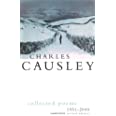I’ve always loved the poetry of Charles Causley (1917-2003). He is widely anthologised but although he received the Queen’s Gold Medal for Poetry and was appointed CBE in 1986, he wasn’t Poet Laureate, he didn’t get a knighthood and he didn’t do much broadcasting. He was never a household name as others of his generation such as John Betjeman, Ted Hughes and Seamus Heaney were. Perhaps Patrick Gale’s forthcoming novel Mother’s Boy, a fictional biography of Causley will help to change that.
Causley, who was a primary school teacher, was born in Launceston in Cornwall and lived there all his life apart from six years service in the Royal Navy in World War Two. Unsurprisingly, therefore, a lot of his poetry (but by no means all) relates to schools, Cornwall or war. If you accept that poetry can be “taught” – and I’m half with you if you don’t – then I have taught many Causley poems to many classes over the years. Or at least I’ve led students to it and found ways of helping them to think about layers of meaning and the applied use of poetic technique to enhance meaning. It’s a bit like exposure to music, really.
I bought Charles Causley Collected Poems in 1992, when it was published, and that’s the volume I have reread now with fond affection and admiration. At the time Causley, who was then 75, wrote “This book contains all of my poems I wish to preserve”. There has been a revised editions since the 1992 volume.
He was as good a technician as Tennyson. When I reread “Cowboy Song” I marvelled yet again at the brilliance of anyone who can come up with this:
I come from Salem County
Where the silver melons grow
Where the wheat is sweet as an angel’s feet
And the zithering zephyrs blow.
I walk the blue-bone orchard
In the apple-blossom snow,
When the teasy bees take their honeyed ease
And the marmalade moon hangs low.
It ripples along like Mozart. And, as with Mozart, as soon as you start to unpick it you realise just how complex it actually is and marvel all over again at his blended use of rhyme, alliteration, consonance and assonance to create rhythmic musicality.
Causley wrote in every conceivable form. “The Ballad of Charlotte Dymond” uses the traditional ballad form with end-rhymes ABCB to tell the story of a nineteenth century servant girl who was murdered on Bodmin Moor:
Charlotte walked with Matthew
Through the Sunday mist
Never saw the razor
Waiting at his wrist.
Or take “Ballad of the Bread Man” one of his many poems rooted in Bible stores and religious reflection:
Mary stood in the kitchen
Baking a loaf of bread
An angel flew in through the window.
‘We’ve a job for you’ he said.
I doubt many British students leave school without reading and thinking about Timothy Winters who comes to school /with eyes as wide as football pool – dirty, neglected at home but unaware of his own situation as he slowly goes on growing up. It’s written in quatrains with a marching AABB rhyme pattern. “Seasons in North Cornwall” in which spring has set off her green fuses/Down by the Tamar today is thoughtfully full of colour. Who could forget the white ships of winter ?
Chief Petty Officer is a blank verse account of a man with boots and a celluloid Crippen collar,/ Buttons and cruel ambitious eyes of almond. It’s a deliciously vivid portrait:
He was probably made a Freemason in Hong Kong.
He has a son (on War Work) in the dockyard,
And an appalling daughter
In the WRNS.
But I think my favourite Causley poem of all is “Death of an Aircraft” inspired by an incident in the Cretan campaign in 1941. It’s a narrative poem which sustains a magnificent metaphor of a shot down plane as a dead whale and the sky as the sea:
One day in our village in the month of July
An aeroplane sank from the sea of the sky
White as whale it smashed on the shore
Bleeding oil and petrol all over the floor.
The story which follows is a chilling one of courage and daring. Look at this sardonic cynicism when three carefree young saboteurs are caught by the Germans. The latter have been made to look stupid and have a firing squad on hand:
One was sent to the county gaol
Too young for bullets if not for bail,
But the other two were in prime condition
To take on a load of ammunition.
Do reread some of Causley’s poems. I don’t think you’ll be disappointed. He may not be fashionable but by golly, he’s good. And if he’s new to you then you have a sumptuous treat in store.

Next week on Susan’s Bookshelves: The Glassblowers by Daphne du Maurier